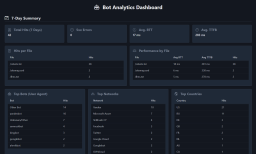Some Experiments into How Google's Crawler works
Why experiment with Googlebot Beyond the fact it is interesting to understand how it works, it is potential useful if you ca...
Expert insights, guides, and tips to improve your website's SEO performance
Why do we support Data Driven SEO? I've been spending some time on the SEO subreddit lately and there's a few things that strike me as worthy of note. The first is that, as ever, there are many differing opinions on SEO. The second is that answers to questions are always stated as absolutes. That's nothing new, of course, but it does seem to be more and more the case. It also reflects both social media trends and trends of SEO personalities. All this occurs while the conflicting theories show that whilst there is agreement on some things, there's no agreement amongst SEO over a lot of things. For people trying to find out about SEOs this causes a lot of confusion.

As a search engine, Google wants to deliver the best possible results to users. There's an argument that if SEOs are producing great pages then there's a somewhat symbiotic relationship there. The issue here is that if people precisely knew the ranking factors Google used to determine what are great pages, then it would be possible to craft the quickest possible page that meets those factors without worrying about it being the best page. Google has a case of split interests here - it's in their interests to encourage SEOs to produce great pages but strongly against their interests for people to understand the ranking factors too well.
Because of this Google has always had a practice of not exactly telling lies, but also not being exactly clear when they say things. By this I mean their wording is almost universally "tricky" when speaking about these things. For example, they'll suggest something isn't a ranking factor. That thing may not be directly coded into the algorithms as a ranking factor. But they'll fail to mention that it does influence another ranking factor. For all practical purposes, if something influences another ranking factor then it IS a ranking factor. But you could never actually argue that Google lied because it isn't coded in there.
In May of 2024 the Google search documentation leak surprised a lot of SEOs. It led to a lot of analysis and theories, many of which we don't subscribe to. But it did reveal some things, such as:
Whereas Google had previously denied using Chrome traffic. And:
Whereas Google has denied things like dwell time. A key question here is is the precise wording for "dwell time" enough to deny it?
To be fair here, some of this may have changed over time. Google could have stated something, but then a change to the algorithms means that's no longer the case. That would make sense with an algorithm that necessarily needs to constantly change. But for some reason some SEOs still happily quote very old statements as fact.
Still: In our view - information from Google (that they haven't released by accident), has to be considered as being biased and must be considered along with the intent. Yes, Google have people who interface with SEOs - but news flash - their job isn't to tell you the ranking algorithm.
But it is common to find SEOs repeating things Google have said, even from years ago, even things that have since been disproved, as gospel!
On reddit their was a question that we can summarize as does linking your blog posts on social media help with indexing/discoverability. Let's set some context around this - lately a topic initiated by Google that SEOs have been talking about is "crawl budget". In the old days a search engine used to be almost be judged based on the size of their index (how many pages it contained). Bigger was better! In more enlightened times search engines seem to have realised that having a large number of good pages is better than having more pages than their competitors because their index is full of an even larger number of bad pages. This means they can reduce the cost of building their search index if the just work out how to crawl the good pages more often and the bad pages less or not at all. That's huge if, for example, you want to direct resources into things like AI. So crawl budget is the topic of the moment. Anecdotally, it seems, people are getting crawled less and naturally want to know how to improve that.
So does linking your blog posts help with that?
In The Crawl Tool, if you link up your account with Google Search Console then it will pull data from the API. It does this to get searches, clicks, keyword data, and page data. Along with the page data Google will occasionally provide some links that get pulled into your "Back Links" report.
One notable thing about those links is that they are sometimes simply a social media link. This occurs on indexed pages. So in those cases it is telling you that it's indexed the page, but the only thing it knows about it is a social media link.
This doesn't tell us anything about if social media helps the page rank (one would expect not very much given it is a link likely created by the site owner themselves). But what it does tell us is that in indexing/discoverability that social media link almost certainly played a part.
Data like this is unbiased, doesn't have an opinion, and doesn't have business interests to protect!
But the interesting thing is that when I mentioned this on the reddit conversation, the categorical answers based on something Google once said continued.
No. In the example above we use the words "almost certainly played a part". We know, for example, that Google removes search and click data from query and page views in Google Search Console so that it under-reports. You can see this by adding up the values for all pages or all queries and comparing it to the main headline figures and you'll see under-reporting. It's possible that Google is also removing/replacing the links, but unlikely.
The Data doesn't necessarily have to indicate a fact, but can also be a strong support for a theory. What's important though, is to use it to underpin unbiased theories (or facts) with a realistic assessment of the accuracy. It can also be the case that there is not enough data to indicate something but only to suggest something.
But by using actual data and a realistic assessment of what it indicates we can separate out the:
"I believe this because a biased commercial entity with an interest in people not knowing the ranking factors once said" (Google said)
vs.
"I believe this because observationally it always seem to be the case" (Every time I put a keyword phrase into the title and H1 it seems to do well)
vs.
"I believe this because of X" (Data)
Because that list goes from the least trustworthy to most trustworthy source.
We would. The Crawl Tool gathers and presents data to help you improve your site and help you improve your search engine rankings. It stands to reason that we have a data-centric approach in both how we do that and how we assess various SEO theories. That's how our users win and outperform their competitors.
Start with a free crawl of up to 1,000 URLs and get actionable insights today.
Try The Crawl Tool Free
Why experiment with Googlebot Beyond the fact it is interesting to understand how it works, it is potential useful if you ca...

LLMS.TXT again I've written about LLMS.TXT in the article about how getting one listed in an llms.txt directory mysteriously...

What's this about Adding Other Media to robots.txt I recently came across John Mueller's (a Google Search advocate) blog. I ...

Understanding the Importance of having a fast Mobile website I, personally, spend a lot of time focusing on site speed. The ...

What are robots.txt, sitemap.xml, and llms.txt These files are used by search engines and bots to discover content and to le...

AI Crawlers and Citing Sources The rise of AI, rather than search, crawlers visiting websites and "indexing" information is ...